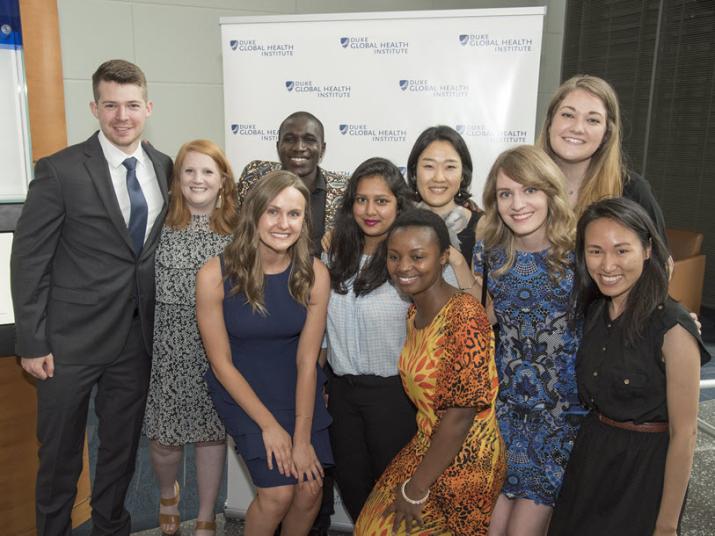
A group of graduating students pose for a photo after the ceremony. Photo credit: Duke Photography.
Published May 15, 2017 under Education News
Last Friday, the Duke Global Health Institute celebrated commencement with 32 new Master of Science in Global Health graduates.
DGHI Director Welcomes Graduates and Guests
DGHI director Michael Merson opened the ceremony, welcoming the graduates and their guests. “You have the potential to make a real impact,” he said. “The world needs you now more than ever, and we’re all counting on you to achieve your dreams.”
MSc-GH Program Director Reflects on Grads’ Opportunities
In her commencement address, Melissa Watt, assistant professor and director of the Master of Science in Global Health program, acknowledged that the graduates are completing their global health studies during a time of uncertainty for the field.
She encouraged students to take this opportunity to make history. “It is these times of uncertainty when we have a choice,” she said. “We can either become insular and fearful, and just hope this will pass, or we can see and seize opportunity—an opportunity to define and articulate our values, an opportunity to show up in new spaces and make our voices be heard, and an opportunity to re-shape the work that we are doing.
She encouraged students to communicate their work through stories as well as facts and figures; to commit to working across disciplines and thinking broadly about whom they engage in their work; to be problem solvers; to renew and rethink the connection between the local and the global; and to recognize and celebrate strength and resilience in themselves and others.
And she assured the graduates that as they enter the next phase of their lives, the community they built at DGHI will be one of their greatest assets: “Look around you,” she said. “Make a commitment to yourselves and each other to continue to nurture this community, and find strength and wisdom in this community.”
Student Speaker Asks, “What is global health?”
This year’s graduate commencement speaker, Michelle Roberts, reflected on the essential question, “What is global health?”
“Global health is an objective,” she offered. “Global health is people taking action, hoping that action makes a difference.” In closing, she urged her fellow graduates to “recognize that the power for real change lies in harnessing the social and cultural power of people, those for whom the experiences we study in global health are a daily reality.”
Roberts, who holds an undergraduate degree in anthropology and political science from Auburn University, conducted her fieldwork in Buenos Aires and Pilar, Argentina, under the mentorship of Janet Prvu Bettger, associate professor of orthopedic surgery and a DGHI affiliate. For her master’s thesis, she used qualitative methods to study family/caregiver experiences with transitional care after an acute neurological event.
Roberts also served as a project coordinator and member of a Bass Connections project, the Global Alliance on Disability and Healthcare Innovation (GANDHI). The project is investigating transitional care and disability in ten countries to develop a cross-culturally appropriate intervention to improve care transitions after acute illness or injury.
After graduation, Roberts will continue to work on the GANDHI project with Bettger through the end of June; she is currently seeking employment in the Seattle area.
